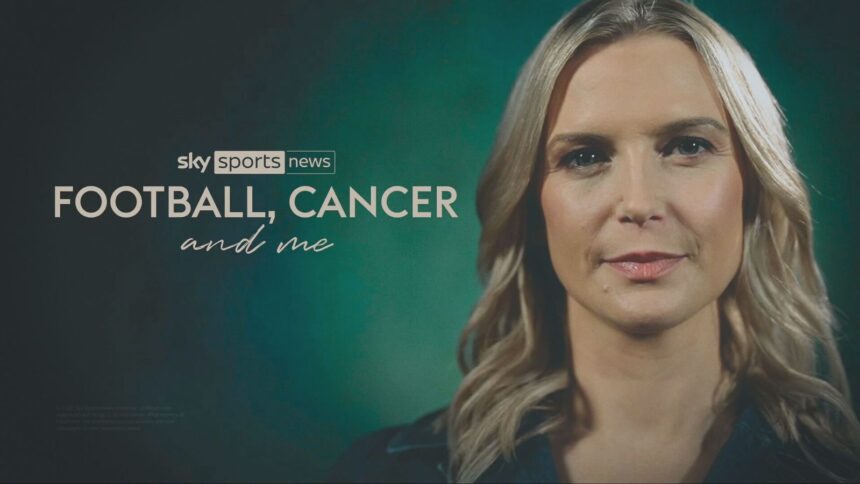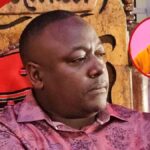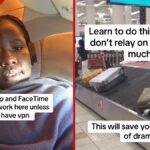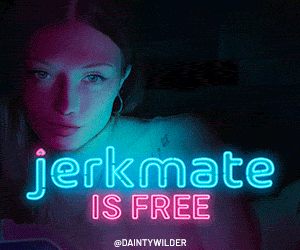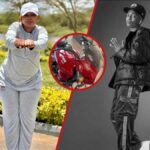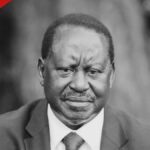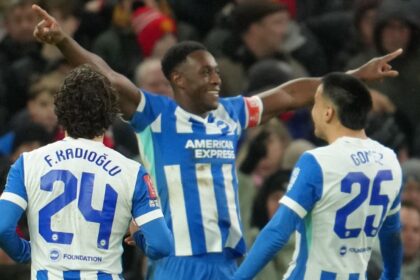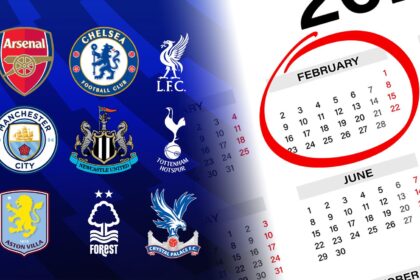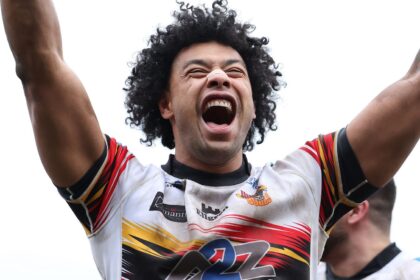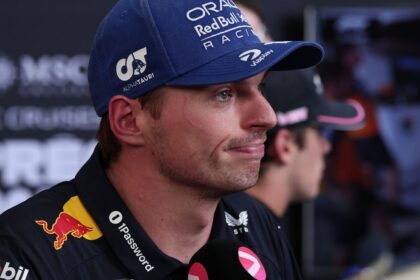In a new Sky Sports News documentary, Jo Wilson opens up on her cancer journey in ‘Football, Cancer and Me’.
The presenter was diagnosed with stage three cervical cancer in 2022, shortly after the birth of her daughter, Mabel. She has now been cancer-free for the last two-and-a-half years.
Jo is joined by four football figures who have also been affected by the illness. They discuss their own experiences with cancer when the documentary airs on Sky Sports News on Wednesday at 4pm.
She chats with David Brooks and Henri Lansbury, who were both diagnosed while playing, Tony Mowbray while manager at Birmingham and Sky Sports reporter Emma Saunders. Jo also meets St Johnstone owner, Adam Webb.
In her own words, Jo takes us through her journey with cancer, how it affected her life and family, and why there is hope for anyone going through the same experience…
—
It was on the 31st of July 2022 when I was told I had cancer.
It hit me like a truck. I did wonder if I’m going to die. I’d prepared myself for the worst – I think you have to.
I actually didn’t tell anyone. It was hard because I didn’t want to put it on anyone. I almost think if I could’ve done it without telling anyone, that would’ve been better because I just didn’t want anyone to worry about me.
If one person can see this and make a phone call with a doctor because of something they feel isn’t right, then it’s worth talking about.
So many people are affected by cancer whether directly or indirectly and if having these conversations, putting it out there so people don’t feel alone, and that there is life after cancer.
—
I knew something wasn’t right so I went to get checked out. I absolutely thought I’d be told ‘oh it’s a bit of a hangover from giving birth’, but I was told that day that it looked like I could have cancer.
It’s not something you ever expect to hear and your life changes in an instant.
But the weirdest thing was how nothing changes for a few weeks because you have that period of time where you’re going for further tests and scans. They need to know what type of cancer it is and come up with a treatment plan.
There were a couple of weeks where I was living my life as normal. I went to a wine festival in Cheltenham that weekend and I was looking around at everyone having a good time thinking ‘I’ve got cancer’.
It’s mad how life just carries on, but at the same time, you know your whole life has changed and is about to change.
—
My treatment plan was five weeks of radiotherapy every day, Monday to Friday. Five weeks of chemotherapy once a week, every Wednesday, then three days of brachytherapy, which is quite an intrusive form of internal radiotherapy.
I didn’t tell anyone about my diagnosis until I had that treatment plan because I wanted to be able to phone my mum and tell her ‘this is happening, but this is the plan and this is how we’re going to get through this’.
It was hard because I didn’t want to put that on anyone. I almost felt like ‘I can cope with this’, but I didn’t want anyone else to worry and stress about me.
I knew my mum and dad would be really upset and they would feel quite helpless because there’s literally nothing they could do to help me in that moment.
As a mum myself, you know you’d do anything for your children and you don’t want them to have any suffering. I knew how hard they would find it.
Chemotherapy days were the hardest. I remember the nurse talking me through it and I said ‘how is this going to make me feel?’ and she said ‘everyone reacts differently so there’s no way of knowing’.
Not knowing I found quite difficult to deal with because you’re looking at it going ‘OK, this liquid is going into me, I don’t know how it’s going to make me feel, I don’t know how my body is going to react’, but at the same time, it’s the thing that’s hopefully going to make me better.
There were moments where I was on the floor crying, being like ‘I cannot do this, I cannot go to my treatment’.
The last part of my treatment was brutal. It was three days in hospital, I got put to sleep and had 14 metal rods inserted inside me, then for those three days, I had to lie flat on a hospital bed. I couldn’t eat, I couldn’t move.
I also wasn’t allowed to see Mabel because she’d want to cuddle and climb on me and I didn’t want her to see me like that anyway.
But it was the first time I’d been apart from her since I’d given birth. That was probably the darkest time, lying in that hospital bed.
I say she got me through my treatment and it was only three days, but it was the first three days I’d spent apart from her.
When I was first diagnosed, Mabel was 18 months old. She became my focus and why I got up every day despite the sickness and exhaustion.
Being able to slip back into mum mode kept me going because even on my darkest days, she was my reason for everything. Without knowing it, Mabel was my rock.
I did say my first question was ‘am I going to die’ and that wasn’t about me. I came to terms with death and that it could be the reality for me, but what I wasn’t OK with was the prospect of leaving her without a mum.
—
When the treatment stops, it’s hard because you’re suddenly just left there to deal with what’s happened.
You feel like the support has been taken away a little bit because you’re not going in for treatment and that recovery is hard because you still feel ill. I was still very tired and trying to deal with the psychological effects as well.
Things like scans very quickly become a big part of your life, as does the anxiety of the disease potentially coming back.
I find some people think ‘you’ve had cancer, you’ve had the treatment, now you’re better’, but it doesn’t work like that. I probably think about it every single day in some form.
I woke up with a really sore back a while ago and with the type of cancer I had, one of the biggest symptoms for a recurrence is a sore back, and I thought ‘it’s back’.
It’s quite a hard thing to get your head around that you now need to wait and hope that it’s worked.
I still didn’t want to see people because I’d lost a lot of weight and I felt like I didn’t look healthy. I also didn’t know if it had worked or not and I wasn’t ready to have those conversations with people.
—
Being told I was cancer-free felt incredible. You can’t even describe the feeling when you hear those words, that the treatment has worked, because it’s all you’ve hoped and wished for.
It is the hardest thing that I’ve ever had to deal with, but I’ve got through it and I’m cancer-free, I’m alive and life is good.
It’s so horrendous that you think you should be celebrating getting the all-clear, but it’s perhaps not because it’s a horrible thing to have gone through.
I’m now two and a half years cancer-free, but I don’t know if you ever really are because it’s still something I think about every day. As the days go on, you think about it less and less, but it’s still something I think about.
I am living with side effects as well. I’m 40 years old, but it’s aged me. I was plunged into early menopause, I’m infertile so I was told my treatment would mean I couldn’t have any more children.
Even psychologically, it’s difficult. I don’t think it’s something that ever leaves you.
I felt so happy for Mabel. You almost start to picture your little girl’s life and I remember having thoughts about not seeing her start school.
—
I’ve always been sporty so that competitive spirit comes out in anything I do. That helped me a lot when I was going through my treatment in terms of being able to deal with it and that resilience as well, it plays a part in playing sport my whole life.
Then the wider football family, being involved in sports media, the support that I got from there meant absolutely everything to me.
The outpouring of support I got from the footballing and sporting world, people I’ve never met or spoken to… when I came back to work, I posted on social media and the amount of messages from people who were genuinely so happy and pleased to see me come out of the other side.
Life is good, life is happy. Life is about enjoying the little moments, spending time with people you love and doing things that make you happy.
It changes you absolutely. You can’t go through something like this and not be changed. It puts everything into perspective. None of us know how much longer we’ve got on this earth so it’s about enjoying every day.
You can get through it. People will help you get through it and there is life after cancer.
If you or someone you know has been affected by cancer, you’re not alone. For support and information, please visit: cancerresearchuk.org or macmillan.org.uk. You can also speak to your GP or call the Macmillan Support Line on 0808 808 00 00.
Watch ‘Football, Cancer and Me’ with Jo Wilson on Sky Sports News at 4pm on Wednesday. The documentary will also be available On Demand.





